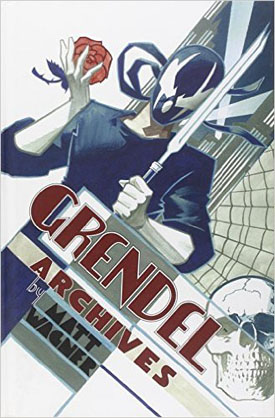
Matt Wagner was one of a generation of writers and artists who essentially remade comics in the 1980s. This does not count R. Crumb and the others who opened comics up to new modes of expression (and content) in the 1960s, or the singular examples of outrageousness such as Krazy Kat and Little Nemo that have inhabited the comics world since its beginning. (And one wonders when that might actually be — Gustave Doré? Francisco Goya? Egyptian tomb paintings? Lascaux and Altamira? There’s quite a deep provenance here.)
At any rate, as Wagner says in his introduction to Grendel Archives, he was one of a “small but vocal contingent of creators who wanted something fresh and different out of our favorite medium.” Thus, we, the beneficiaries of this desire, have been the recipients of Neil Gaiman’s Sandman, Alan Moore’s Swamp Thing, and Wagner’s own creations, Mage and Grendel.
Grendel began as an offshoot of Mage, and the first appearance of best-selling novelist Hunter Rose, who was otherwise the crime lord and assassin Grendel, and his arch-enemy the wolf-man Argent, was as a short story in Primer #2, followed shortly by the self-titled stories centered on Grendel himself, which went on to become a major series.
The initial reaction was not uniformly positive. As Wagner puts it, the first reviews were “nothing less than downright savage.” Well. The rest, as they say, is history.
Dark Horse Books, on the twenty-fifth anniversary of Grendel’s debut, put together the original Primer story and the first three numbers of Grendel in a hardbound edition.
But what about the thing itself?
Looking through these first four numbers of the Grendel saga, several things struck me. First, the writing is a little rough, but then one doesn’t expect a lot of subtlety in comics, and sometimes it’s convenient to have the back story laid out plainly. That’s what the first two numbers of Grendel are: back story, first Grendel’s, then Argent’s. Then comes the set-up for the first adventure.
Second is the role reversal. Grendel is, in the normal arrangement of things, a bad guy: an assassin, a crime boss, almost completely amoral, interested only in “the Game.” Because of a mutation that affects his brain, he’s better at everything than anyone else. One reason he values Argent is that Argent is the closest thing to a peer he’s known since the death of his mentor, Jocasta Rose. He has vulnerabilities, however, as we learn in short order. So, yes, definitely a villain, but he happens to be the hero. Argent was an Algonquin shaman, cursed by his people’s wolf god. In the normal course of events, he’d be the good guy — fighting evil and all that — but the curse leaves him with an unfulfillable urge toward senseless mayhem — he can’t seem to kill enough. He at least has chosen as his target the undesirable elements of society, but the boy has a distinct problem. In the black-and-white world of traditional comics, we’re already seeing a major change.
Speaking of black-and-white, I love the style of the illustration — it brings home all the meanings of the word “graphic.” Stark, spare, and very clean, but Wagner has rung variations on that theme. Grendel himself is pure black-and-white, flat, undetailed. Argent is black and gray, indistinct, a shadow figure. Action sequences make both visual and narrative sense, and effects are used intelligently. In that area, it’s obvious Wagner knew what he was doing.
The virtue of coming late to something like this is that someone will go back and collect all the individual issues into an omnibus, so catching up becomes relatively painless. Looking at Grendel‘s beginnings from the vantage of now, I’m not sure the brickbats were justified. It’s not perfect, but there’s a lot of potential here, which, as it turned out, was ultimately realized.
(Dark Horse Books, 2007)
